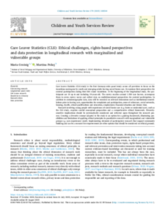Care Leaver Statistics (CLS study) is the first Germany-wide panel study across all providers to focus on the transitions undergone by youth and emerging adults leaving out-of-home care. It examines their perspectives for societal participation during their life course transitions. At the beginning of the longitudinal study, the participants are 16 up to and including 19-years-old. The survey reaches around 1.500 care leavers, accompany them in seven survey waves and collect data on multidimensional perspectives for societal participation. In addition to sociodemographic data, data will be recorded on relevant dimensions such as institutional constellations prior to leaving care, opportunities for complaints and participation, sense of coherence, social networks, housing, health, school qualifications and education, employment, financial situation and leisure time.
Research involving young people with experiences of out-of-home care (e.g. foster or residential care), such as the CLS study, requires careful conceptual preparation and a comprehensive ethical framework. Diversity-sensitive implications should be systematically considered and reflected upon throughout the research process. Creating a diversity concept adapted to the study is an option for a guiding framework, illustrating possibilities and limitations of applying ethical principles in quantitative research with marginalized and vulnerable groups e.g. care-experienced youth. Implementing elements of participatory research that support community building and can be a resource for empowerment are other options that should be considered on ethical grounds.

